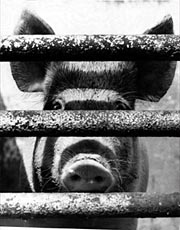News from academe.

Art Fraud
A handful of art historians are accusing Robert Hughes of plagiarism at worst, and ungraciousness at best, in failing to credit their scholarship in his recently published epic survey of American art, American Visions. Hughes' book and an accompanying TV series appeared this spring, and while both were met with enthusiastic reviews, a couple of critics noted that Hughes, the art critic for Time magazine, provided neither footnotes nor a bibliography, and made scant mention of colleagues' work. Now the Chronicle of Higher Education cites complaints from two art historians, Alan Wallach at the College of William & Mary and Alexander Nemerov at Stanford University, who claim that Hughes presents, but fails to credit, their readings of paintings by Thomas Cole and Frederic Remington. "Hughes, Time-Warner, et al. are making megabucks from your research," Wallach fumed to other art historians in an online discussion. Wallach has written a letter of complaint to Knopf, Hughes' publisher.
In Defense of Cloning
A group of self-proclaimed humanists--including selfish-gene theorist Richard Dawkins, novelist Kurt Vonnegut, philosopher Isaiah Berlin, and DNA co-discoverer Francis Crick--have come out in defense of cloning human beings. Reacting to claims by such figures as Bill Clinton and the pope that Dolly, the cloned ewe, represents a moral threat, members of the Amherst-based International Academy of Humanists have issued a declaration applauding cloning technology and dismissing religious critics as Luddites. Published in the current issue of the secular humanist journal Free Inquiry, the declaration asserts that "the moral issues raised by cloning are neither larger nor more profound than the questions human beings have already faced." In an accompanying essay, Dawkins suggests cloning could in fact be fun: "Wouldn't you love to be cloned?" he asks. "I've never admitted it before, but I think I would."

Pigging Out
New evidence from pig farms suggests that eating disorders may be genetic, not cultural, in origin. Social critics have long accused women's magazines like Vogue and Glamour of creating unattainable images of female beauty that have led to rampant anorexia. But according to the Times Higher Education Supplement, pig farmers, in an attempt to meet increased consumer demand for lean pork, have over the last few years been breeding thinner pigs--some of which display symptoms of anorexia. The prevalence of "wasting pig" and "lean sow" syndromes among skinny swine suggests that self-starvation may be a recessive genetic trait. "With intensive breeding, an increasing proportion of defective genes are inherited," reports John Owen, a professor of agriculture at the University of Wales. Still, in pigs, as in human beings, individual anxiety may be what triggers eating disorders, even among the genetically predisposed. Explains Owen: "Stress-induced situations for pigs would include early separation from the sow and having to mix with pigs from outside their own group, which leads to bullying until a new social order is established."
Shakespeare Wars
A previously undistinguished bit of Jacobean verse has achieved official recognition as the work of William Shakespeare. Thanks largely to the efforts of Vassar College's Donald Foster, who speculates about literary authorship using an electronic database of texts of early modern literature, the 585-line "Funeral Elegy," as it's come to be known, appears in the new Riverside and Norton Shakespeare editions, both released last month. Foster--who also analyzed Primary Colors last year and accurately identified Joe Klein as the author--discovered the elegy in 1984 and, in last October's issue of PMLA, wrote that it "is formed from textual and linguistic fabric indistinguishable from that of canonical Shakespeare." But many scholars disagree. The current PMLA contains arguments against Shakespeare's authorship on both lexical and aesthetic grounds. One critic calls the poem a "work of unrelieved banality ... lacking a single memorable phrase"; others suggest other possible authors (such as Elizabeth Cary, a noblewoman who was a dilettante playwright and Shakespeare fan). Even J.J.M. Tobin, editor of the Riverside edition, observes in his introduction to the poem that it has "none of the metaphoric genius that makes Shakespeare Shakespeare."
Witch Hunt
An English professor who has openly admitted to instructing undergraduates in pagan rituals is no longer a candidate for a deanship at State University of New York's New Paltz campus. According to the Chronicle of Higher Education, Rosemary Keefe Curb was one of three finalists for a job as dean of the college of arts and sciences until a local New Paltz resident acquired a copy of Lesbian Nuns: Breaking Silence, a book Curb co-edited that contains such statements as: "I've never been initiated into a coven, but I like to call myself a witch." In May, after receiving negative coverage from the local press, the university scrapped its search without making a hire, announcing that none of the finalists met "current institutional needs."